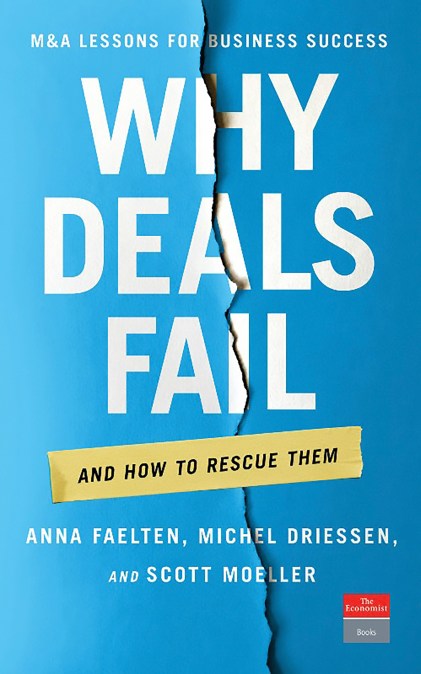Shopping Cart
Why Deals Fail
And How to Rescue Them
Description
The combined value of all M&A deals from 1980 to the end of 2015 was almost 65 trillion — bigger than the current annual world economy value outside the US. In that same period, almost 900,000 deals were announced. Many were questionable, as Why Deals Fail shows. With companies expected to continue to merge in record numbers, it is time to learn some critical lessons from those deals.
In 2014 the government of the UK — one of the most open markets globally for M&A — commissioned Cass Business School’s Mergers and Acquisitions Research Centre, headed by Scott Moeller, to investigate whether M&A has a negative or positive impact on the country’s economy. Their findings: M&A deals do generate short-term benefits for the economy, especially because some large deals were spectacularly successful. However, over the longer term, the results are less clear-cut. Despite those highly successful tie-ups that drove the economic results to an overall positive average, the majority of UK mergers by number in the research period actually destroyed value. In summary, deals can be hugely beneficial for all involved when you get it right but they still, at large, struggle to live up to their initial hype — and potential. Done wrong, they can damage business and, by extension, the economy and result in hundreds if not thousands of employees being made redundant. Most of the mergers detailed in this book are lessons in what not to do; the authors get behind the corporate veil to show what went wrong when huge and otherwise highly successful global businesses such as the Royal Bank of Scotland, Microsoft, and HP embarked on M&A transactions.
Why Deals Fail is aimed at business people who want to understand better how M&A can drive corporate fortunes. Whether you are a seasoned M&A professional, an employee in a company that is acquiring or being acquired, or a newly graduated business student doing analysis about a deal, this book will help you to make the right decisions when they are most crucial.
In 2014 the government of the UK — one of the most open markets globally for M&A — commissioned Cass Business School’s Mergers and Acquisitions Research Centre, headed by Scott Moeller, to investigate whether M&A has a negative or positive impact on the country’s economy. Their findings: M&A deals do generate short-term benefits for the economy, especially because some large deals were spectacularly successful. However, over the longer term, the results are less clear-cut. Despite those highly successful tie-ups that drove the economic results to an overall positive average, the majority of UK mergers by number in the research period actually destroyed value. In summary, deals can be hugely beneficial for all involved when you get it right but they still, at large, struggle to live up to their initial hype — and potential. Done wrong, they can damage business and, by extension, the economy and result in hundreds if not thousands of employees being made redundant. Most of the mergers detailed in this book are lessons in what not to do; the authors get behind the corporate veil to show what went wrong when huge and otherwise highly successful global businesses such as the Royal Bank of Scotland, Microsoft, and HP embarked on M&A transactions.
Why Deals Fail is aimed at business people who want to understand better how M&A can drive corporate fortunes. Whether you are a seasoned M&A professional, an employee in a company that is acquiring or being acquired, or a newly graduated business student doing analysis about a deal, this book will help you to make the right decisions when they are most crucial.
Newsletter Signup
By clicking ‘Sign Up,’ I acknowledge that I have read and agree to Hachette Book Group’s Privacy Policy and Terms of Use
